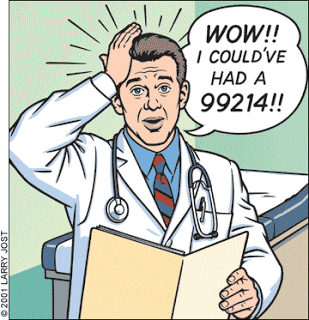 write notes in the chart day after day? Why does the chart even exist? In my mind, the main function of the medical chart (and progress notes) is communication: charting allows physicians (and other members of the health care team) to effectively communicate with one another when face-to-face communication is not possible. In recent years, however, it seems as if charting has taken on a different primary function: that of a medicolegal document. Not only does the medical chart serve as the official log for documenting what was and wasn’t done correctly (in the event of a lawsuit), but it also serves an important function in billing–in order for a physician to get reimbursed for a particular service, he or she must formally document that service, typically by using key words or phrases, within the written chart. Failure to do so correctly can result not only in a failure to get paid hard-earned money, but can even result in allegations of billing fraud.
write notes in the chart day after day? Why does the chart even exist? In my mind, the main function of the medical chart (and progress notes) is communication: charting allows physicians (and other members of the health care team) to effectively communicate with one another when face-to-face communication is not possible. In recent years, however, it seems as if charting has taken on a different primary function: that of a medicolegal document. Not only does the medical chart serve as the official log for documenting what was and wasn’t done correctly (in the event of a lawsuit), but it also serves an important function in billing–in order for a physician to get reimbursed for a particular service, he or she must formally document that service, typically by using key words or phrases, within the written chart. Failure to do so correctly can result not only in a failure to get paid hard-earned money, but can even result in allegations of billing fraud.
Thus, it’s important to know the dialysis billing codes. Despite its central importance, the details of billing weren’t really emphasized to me during either my residency or my fellowship training. Here are a few of the important billing codes and important billing issues related to nephrologists, focusing primarily on the relevant “CPT” (or “Current Procedural Terminology”) codes for dialysis. If there are any seasoned nephrology vets out there, please feel free to make comments or clarifications, as I’m just personally discovering the coding game:
- Inpatient Dialysis Codes. The main issue to be aware of here is that in order to get reimbursed for supervising a dialysis session, the attending physician must be physically present while the patient is undergoing the dialysis procedure. Seeing the patient beforehand and writing out the prescription is not enough–you have to be present while the patient is hooked up to the machine. I have been advised to write something like, “The patient was seen and examined while on dialysis,” as well as being careful that your date & time on the note is consistent with the patient’s time on dialysis. Obviously, this applies only to attendings and not to fellows. The standard inpatient hemodialysis code is the “90935”. If you see a patient in the morning and then their status changes such that they now require dialysis, you can still get credit for the procedure by billing a “90937” (again, as long as the nephrologist is present for part of the dialysis procedure). A separate set of codes (“90945” for single visit and “90947” for multiple visits) is used for other dialysis procedures such as peritoneal dialysis; I believe this code can also be used for coding CVVHD.
- Outpatient Dialysis Codes. A list of the major outpatient dialysis codes can be found here; they are generally submitted monthly: the main ones for adult dialysis are “90960” (for 4 face-to-face visits per month), “90961” (for 2-3 face-to-face visits per month), and “90962” (for a single face-to-face visit per month). Separate codes exist for patients who are dialyzed for only a few days out of the month, or for supervising home hemodialysis (“90966”).
The process of nephrology billing is sufficiently complex that the Renal Physicians Association offers full-day “Coding and Billing Seminars” around the country. The discussion above does not even go into the intricacies of billing for individual injectable medications or all the important disease-specific codes (e.g., ICD-9 codes for CKD, hypertension, etc) which are routinely encountered in outpatient clinical practice.



Thanks for this post, very useful for a first year fellow.